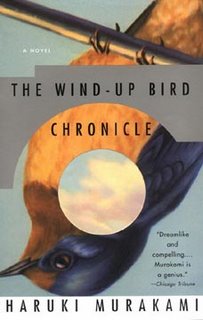(translated from Japanese By Jay Rubin)

I finally finished reading TWUBC back in June after my return from Vietnam, and for my first Murakami novel, it was a surprisingly rich and rewarding read. I didn't know anything about the author, only that he’s a well-regarded “Gen X” writer in Japan and he must have a decent following because I had some trouble finishing the library copy of this book because other people kept placing holds on it!
The novel begins by introducing the daily routine of recently unemployed Toro Okada. While his wife, Kumiko, goes to work during the day, Toro runs errands, makes lunch, reads, takes a nap, and prepares dinner for his wife’s return. The only conflict is that Toro and Kumiko have just lost their cat, and once in a while, Toro gets the odd strange phone call from an unknown woman. Other than that, nothing much happens.
Then Kumiko arranges for Toro to meet with a charismatic psychic to help them find their cat. And Toro starts to take walks around this neighbourhood, partly to search for the missing cat and partly to explore the abandoned house down the back alley. From there, various characters are introduced, and through their seemingly random histories, the novel expands into a multi-layered tale of near-epic proportion where we go back and forth between present-day Tokyo, the Mongolian front, a Soviet prison camp and a Shanghai zoo during WWII, as well as explorations into the subconscious netherworld of the protagonist’s mind. Before you know it, this self-effacing slacker embarks on a heroic quest to save his loved one!
The best thing about the book is that even though it quite capably juggles a confluence of Japanese history, personal tragedies, magic realism, the supernatural, operatic influences of The Magic Flute, not to mention over 600 pages of text… elements which contribute to an epic novel, the author still imbues a very subtle, low-key atmosphere. I hate to sound clichéd, but I find the approach zen-like, very Japanese, yet still familiar to the western reader. The only critique I had was the device of the wind-up bird to "tie things together", the only element which I found a bit too contrived.
Reading TWUBC was like watching a film by Ozu and Jarmusch. There’s a tension between reality and unreality; there’s a real-ness to Toro’s unassuming life, in how people go in and out of it, and a disconnected style to the writing and how the characters speak when describing bizarre events. So when things get progressively more surreal and Lynchian, it also seems to happen in the most normal and natural way. The protagonist, especially, has a sense of quiet acceptance and distance, even when he discovers there’s more to his slacker persona than he realizes. Like dsgran’s review, I appreciated how the story didn’t explain too much, like what exactly was the nature of Kumiko and her brother’s strange power? It made for a more interesting and enigmatic read. I’ll definitely be reading more by this author.
3 comments:
Nice post! The Ozu-Jarmush connection makes a lot of sense in an odd kind of way. I'm glad that you enjoyed the book as well - I'm onto "Kafka and the Shore" now. Very similar feeling, but this one jumps into the surreal quite quickly.
I can't put my finger on it, but WUBC book left me wanting just a little bit more- I didn't need more explanation perhaps, but more resolution. I'm not sure if that makes sense or not...
OMG, I just finished "Kafka on the Shore"!!! thanks to Conan's bro-in-law who left a copy when he last visited with Miranda.
even though this is only my 2nd Murakami book, I can already see the motifs and themes he's obsessed with. and man, this guy definitely loves having cats in his stories.
and yeah, I know whatch mean about wanting to linger more in WUBC's world. that's definitely a big part of the appeal of Murakami's fiction.
Nice. Can't wait to read your review, but don't put up any spoilers wihtout a warning!
I was thinking about your ozu-jarmush comment while i was reading the other day- i could definatly see it made into a movie if it had the right director who wouldn't try to pry a stronger narrative or satisfactory conclusion out of it.
Post a Comment